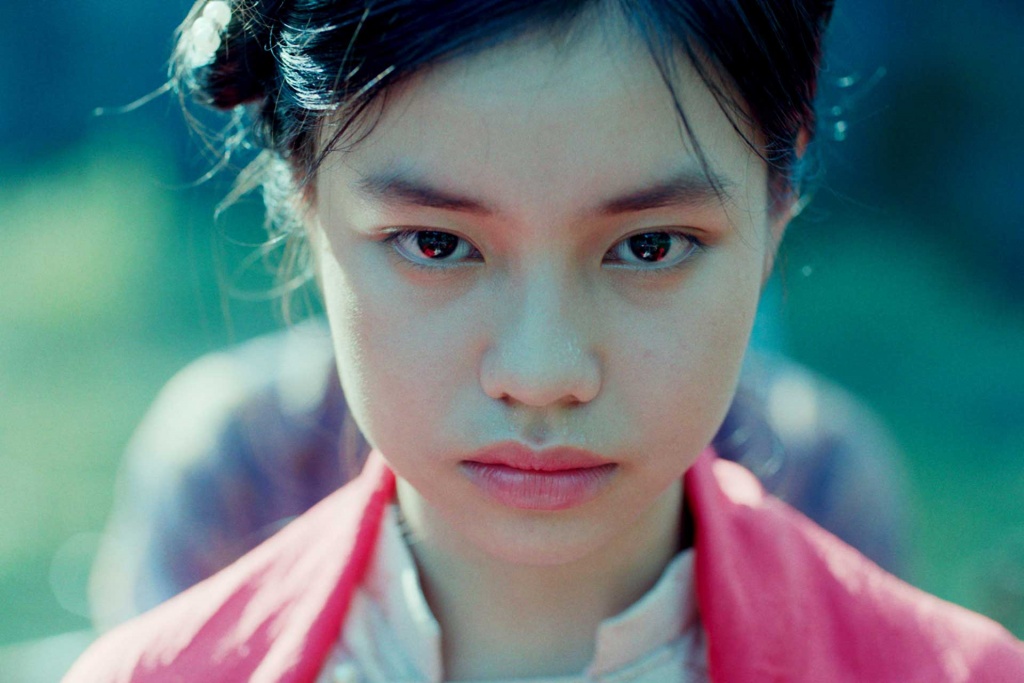Inspired by true events, “The Third Wife” is a quietly powerful story about oppressed women in 19th-century Vietnam. An astonishing directorial debut by Ash Mayfair, this stylish drama opens July 12 at the Landmark Ritz at the Bourse.
Fourteen-year-old May (Nguyen Phuong Tra My) arrives via river at the estate of her husband, Hung (Le Vu Long), a wealthy landowner. Just as May observes the activity around her, viewers, too, must determine the dynamics of the household. Hung’s first wife is Ha (Tran Nu Yen Khe). She bore him a male child named Son (Nguyen Thanh Tam), who is now at the age of marriage. Hung’s second wife is Xuan (Main Thu Huong), who bore him three daughters who are closer to May in age. When May first sees the beautiful Xuan, May’s gaze lingers a little too long on her, indicating that May’s desires are sapphic in nature.
“The Third Wife” initially focuses on May’s wifely duties. In a mesmerizing scene involving a raw egg yolk (a fertility symbol) — positioned on her navel for Hung to swallow — May loses her virginity. She soon becomes pregnant and later prays to have a male child so as to gain favor with her husband. She sees how Ha is more appreciated than Xuan because of the gender of their children. Moreover, if May produces a son, she may not need to produce more offspring.
However, it is May’s relationships with Ha and Xuan that provides the most interesting aspect of this hothouse drama. How these women interact — bonding, competing — gives “The Third Wife” a feminist edge. When May says she feels pain having sex with Hung, she is counseled to fake happiness. It shows how these women cope with their situation, an environment where they are stifled and oppressed.
Mayfair lets “The Third Wife” unfold slowly, creating a seductive mood amid the lush, colorful vegetation. A visual metaphor of silkworms in a cocoon juxtaposes May’s pregnant belly in one scene — the emphasis here that nature extends beyond the obvious symbolism of worm to butterfly, Mayfair also indicates the feeling of entrapment and isolation as May feels like an outsider in this insular society.
One notable sequence has May act on her infatuation with Xuan. She follows the second wife into the woods only to see Xuan being orally pleasured by Son. The forbidden love May feels for Xuan is mirrored in the taboo relationship between Xuan and Son. How these relationships play out creates some of the film’s dramatic tension. Son is forced to marry a young girl and refuses, while May boldly tells Xuan she loves her in a tender, intimate moment they share.
Mayfair handles the film’s critical moments elegantly. When May confesses her love for Xuan, it is while the second wife is applying ointment on May’s belly to keep the pregnant girl’s skin supple. A mildly erotic scene, it also involves a kiss that ends abruptly despite the women’s apparent attraction. In these moments, viewers will be under the spell of “The Third Wife.”
The film is so delicate that even a discussion about the father of a particular wife’s child does not feel soapy.
A probing study of female subjugation and desire, the film resonates because the acting is so strong. As May, Nguyen Phuong Tra My is incredibly expressive. Viewers can understand her every thought. She appears both innocent and calculating at the same time. May is shrewd; when she learns something, she sizes up the situation and acts judiciously, as two critical bedroom scenes demonstrate. In the first, May moistens her fingers to pleasure herself after spying on Xuan enjoying oral sex. Meanwhile, Hung sleeps soundly beside her. In the second, a frisky Hung guides May’s hand along her body and moistens her fingers in his mouth, only to be denied sexual gratification. “Not today,” May says, softly but defiantly, maintaining that she is “fine.”
But May is obviously not fine. Trapped in this exotic world where her same-sex desires are said to be “wrong,” and punishable by God, she is conflicted. Only a few private occasions allow her to release pent up emotions. May lets her mind drift as gorgeous images illustrate — May floats on her back in the water and looks at the sky, her face reflected in the water, indicating her double life.
“The Third Wife” is as beautiful as it is subtle while considering ideas about purity and sin, passion and patriarchy. Mayfair has captured a bygone world with precision. Her film is truly exquisite.
